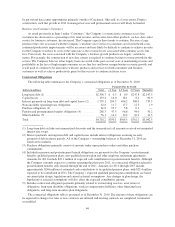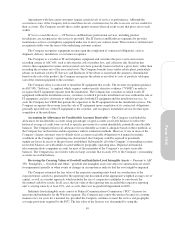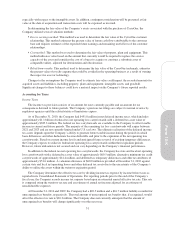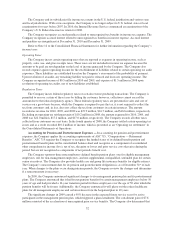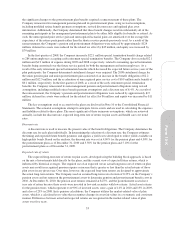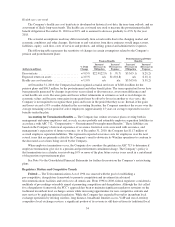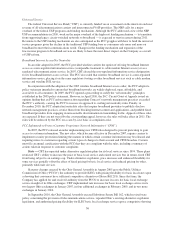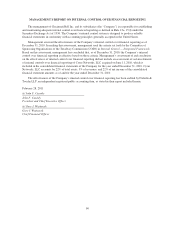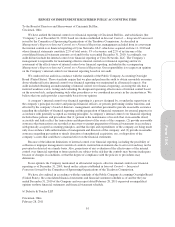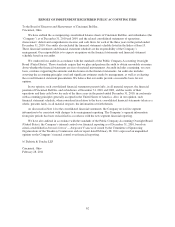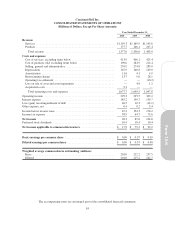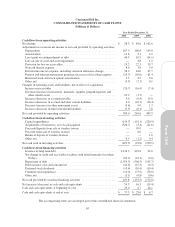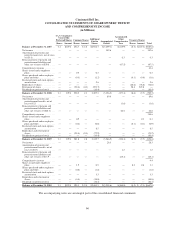Cincinnati Bell 2010 Annual Report Download - page 146
Download and view the complete annual report
Please find page 146 of the 2010 Cincinnati Bell annual report below. You can navigate through the pages in the report by either clicking on the pages listed below, or by using the keyword search tool below to find specific information within the annual report.Universal Service
The federal Universal Service Fund (“USF”) is currently funded via an assessment on the interstate end-user
revenue of all telecommunications carriers and interconnected VoIP providers. The NBP calls for a major
overhaul of the federal USF programs and funding mechanism. Although the FCC addressed a few of the NBP
USF recommendations in 2010, work on the major overhaul of the high-cost funding mechanism — to transition
from supporting legacy circuit-switched networks to broadband — is expected to start in earnest during 2011.
Revisions to the USF funding mechanism are also anticipated as the FCC grapples with how to fund the universal
service programs given the decline in the traditional USF funding base as consumers rely more and more on
broadband to meet their communications needs. Changes in the funding mechanism and expansion of the
low-income program to broadband services are likely to have the most direct impact on the Company as a result
of USF reform.
Broadband Internet Access/Net Neutrality
In an order adopted in 2005, the FCC provided wireline carriers the option of offering broadband Internet
access as a non-regulated information service (comparable treatment to cable modem Internet access) or as a
regulated telecommunications service. In 2007, CBT elected the non-regulated information service designation
for its broadband Internet access service. The FCC also ruled that wireless broadband service is a non-regulated
information service, placing it on the same regulatory footing as other broadband services such as cable modem
service and wireline DSL service.
In conjunction with the adoption of the 2005 wireline broadband Internet access order, the FCC adopted a
policy statement intended to ensure that broadband networks are widely deployed, open, affordable, and
accessible to all consumers. In 2009, the FCC opened a proceeding to codify the “net neutrality” principles
established in the 2005 policy statement. However, in April 2010, the D.C. Circuit Court of Appeals issued an
opinion finding that an FCC enforcement action regarding Comcast’s network management practices exceeded
the FCC’s authority, causing the FCC to reassess its approach to crafting net neutrality rules. Finally, in
December 2010, the FCC adopted net neutrality rules that require broadband providers to publicly disclose
network management practices, restrict them from blocking Internet content and applications, and prohibit fixed
broadband providers from engaging in unreasonable discrimination in transmitting traffic. Appeals of these rules
are expected. If they are not stayed by the court pending appeal, however, the rules will take effect in 2011. The
rules will be enforced by the FCC on a case-by-case basis as complaints arise.
FCC Safeguards to Protect Customer Proprietary Network Information (“CPNI”)
In 2007, the FCC released an order implementing new CPNI rules designed to prevent pretexting to gain
access to customer information. The new rules, which became effective in December 2007, require carriers to
implement security protections limiting the manner in which certain customer information may be released and
requiring notice to customers regarding certain types of changes to their account and CPNI breaches. Carriers
must file an annual certification with the FCC that they are compliant with the rules, including a summary of
actions taken in response to customer complaints.
State — CBT has operated under alternative regulation plans for its local services since 1994. These plans
restricted CBT’s ability to increase the price of basic local service and related services but, in return, freed CBT
from being subject to an earnings cap. Under alternative regulation, price increases and enhanced flexibility for
some services partially offset the effect of fixed pricing for basic local service and reduced pricing for other,
primarily wholesale services.
Statutory changes enacted by the Ohio General Assembly in August 2005 gave the Public Utilities
Commission of Ohio (“PUCO”) the authority to provide ILECs with pricing flexibility for basic local rates upon
a showing that consumers have sufficient competitive alternatives (House Bill 218). Since that time, the
Company has applied for and received authority from the PUCO to increase its rates for basic local exchange
service in eight of its Ohio exchanges. CBT implemented rate increases for basic local exchange service in its
two largest Ohio exchanges in January 2007, in four additional exchanges in February 2009, and in two more
exchanges in January 2010.
In September 2010, the Ohio General Assembly enacted Substitute Senate Bill 162, which revised state
policy concerning the provision of telecommunications service, repealed Ohio’s existing alternative regulation
legislation, and authorized pricing flexibility for ILEC basic local exchange service upon a competitive showing
56


